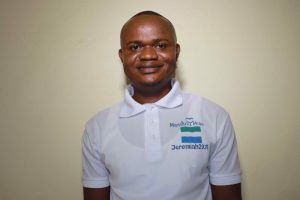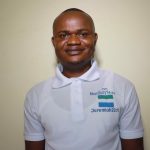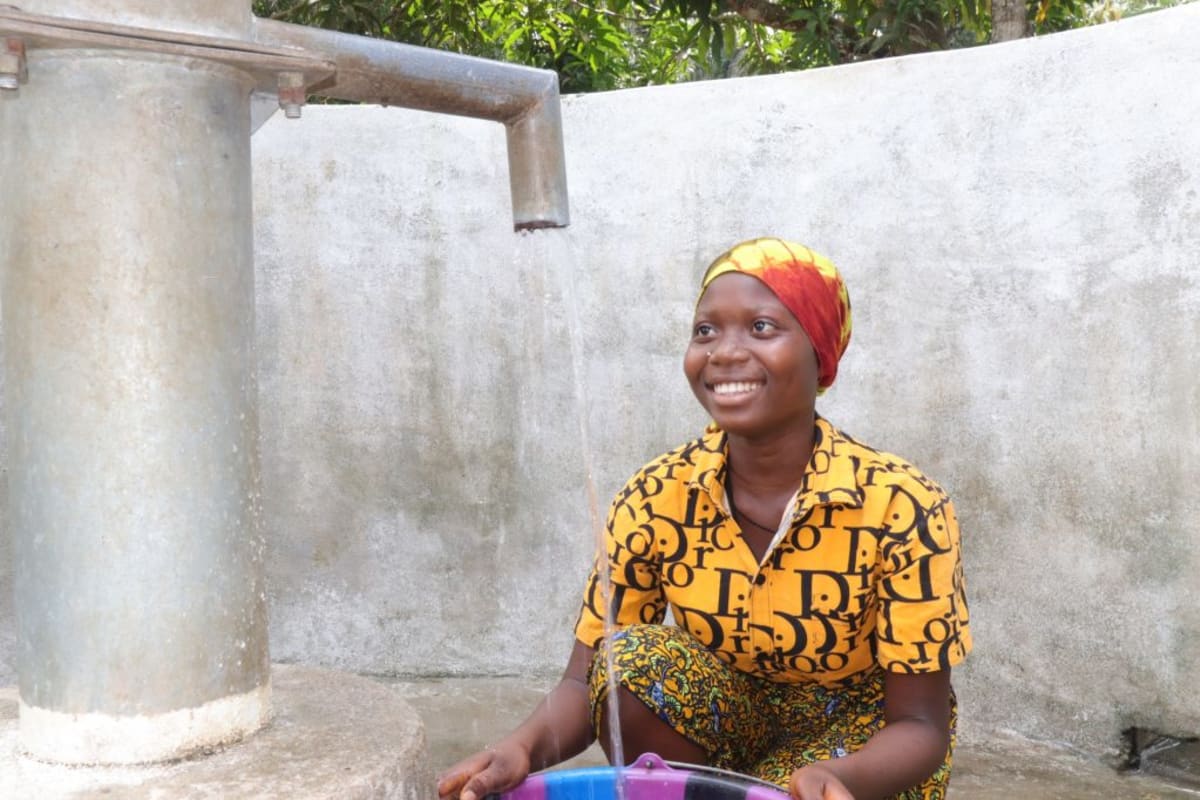February, 2023: Bomp Bana Community Borehole Well Complete!
We are excited to share that there is now a safe, reliable borehole well at Bomp Bana Community. As a result, community members no longer rely on unsafe water to meet their daily needs. We also conducted hygiene and sanitation training, which focused on healthy practices such as handwashing and using latrines.
"It [was] difficult to fetch water from the swamp well in the morning before going to school," said 15-year-old Mariatu K.

Mariatu (in the green striped shirt) celebrates with her community.
"Sometimes, when the water [was] not enough, I would not fetch enough water to complete all my domestic activities," Mariatu continued.

Mariatu pours water.
"The swamp water is also not clean to drink, but it [was] the only water that [was] available in this village for everyone. It is a far distance, but I had to walk to fetch water. I would fetch water after school and prepare food for my family when my mother is on the farm working together with my father. I had limited time to study at home after I had finished doing all daily activities late in the evening. It is now easy for me to fetch water from this pump to my house. I am not worried about time or going to school early because I will now easily fetch water to do all things."

Mariatu (left) and Emma (right) sing and dance in celebration.
"It was not easy to get clean and pure drinking water in my village," said 20-year-old trader Emma Kamara.

Emma splashes water while community women celebrate behind her.
Emma continued: "During the rainy season, it was difficult to fetch clean water from the stream. The water could get dirty after a rainfall. At that moment, it [was] not easy to get clean water to drink. I struggled a lot to filter the water from the dirt before drinking. It is not safe to drink from the swamp because of the filthy condition of it. I am very grateful for this new well in my village. I am proud to say that I can now drink clean and pure water. Now, I have access to enough water at any time that I need water to use."
We held a dedication ceremony to officially hand over the well to the community members.

The community headman (right) and the second headman (left) play drums to welcome our team.
"The whole community received [our] team well with songs," said our field officer Alie. "They gathered at a point singing songs in their local language, Themne: 'we glady today for the new well,' which means they are happy for the new well. This is how they...expressed their joy for the new well because this community suffered for decades to get access [to] pure and safe water."
Several local dignitaries attended the ceremony, including representatives from the Ministry of Water Resources and the Port Loko District Council. Each official gave a short speech thanking everyone who contributed to this water project and reminding everyone to take good care of it. Then, Emma and Mariatu made statements on their community's behalf. The ceremony concluded with more celebration, singing, and dancing.
New Well
The drill team arrived the day before beginning work. They set up camp and unpacked all their tools and supplies to prepare for drilling the next day. The community provided space for the team to store their belongings and meals for the duration of their stay. The following day, work began.

Our team dug two pits next to the drill rig, one for the drill’s water supply and another for what the drill pulls out of the borehole. In some cases, we order a private supplier to deliver the water for drilling since water access is already challenging.
Day one of drilling began as the team mixed water with bentonite, an absorbent clay, in the two dug pits. Next, the team fixed a four-inch carbide-tipped bit to the five-foot-long drill stem. They started the mud pump to supply water to the drill rig so that drilling could begin!

After putting each five-foot length of drill stem into the hole, the team took material samples. We labeled the bags to review them later and determine the aquifer locations.
On the second day of drilling, the team expanded the hole and cleared it of mud. After reaching a total depth of 26 meters, the team forcefully pumped clean water into the well to remove any dirt and debris from the drilling process. We then protected the screened pipe by adding a filter pack. The team hoisted the temporary drilling casing to fortify the pipes with cement.

The community brings their containers to help with the well yield test.
Next, we bailed the well by hand for three days before conducting a yield test to verify the water quantity. This well has a static water level of 16 meters. With these excellent results, we installed a stainless steel pump. Water quality test results showed that this was clean water fit for drinking!

New Knowledge
Before conducting any hygiene training, we called and visited the local water user committee to understand the community’s challenges and lack of sanitation facilities. We shared the findings from our discussions with the committee members to help them make the necessary adjustments before the training began. For example, we identified households without handwashing stations or ones that may need to repair their latrines. With this information, community members worked together to improve hygiene and sanitation at home.
After this preparatory period, we scheduled a time when members from each household using the water point could attend a three-day hygiene and sanitation training. We then dispatched our teams to the agreed-upon location to hold the meeting.

Training topics covered included handwashing and tippy taps, good and bad hygiene habits, disease transmission and prevention, COVID-19, worms and parasites, proper dental hygiene, proper care of the well's pump, keeping the water clean, the cost recovery system, the importance of using dish racks and clotheslines, the importance of toilets, keeping latrines clean, balanced diets, the diarrhea doll, and HIV and AIDS.

A community member asks a question.
The most memorable topic in Bomp Bana was childhood nutrition, during which we explained the importance of ensuring children eat a varied diet. The village headman stood up at the conclusion of our talk to emphasize this point. He agreed with the lesson, and added that he witnesses many people in the community selling off the produce they grow and the animals they slaughter, which leaves them with nothing but rice to feed their children. He urged everyone to take this lesson to heart and feed their children well so they can grow up strong.

Another topic that prompted a discussion was dental hygiene. One older man told all the participants to heed the facilitators' words and take good care of their teeth. He said he hardly ever brushed his teeth throughout his life, and now he has terrible toothaches that wake him up at night. Everyone applauded his story and thanked him for sharing it.

Bai pumps water at the well.
"The three days' training was indeed a good one for me," said community headman Bai Kamara. "I learned a lot from the different lessons being presented. I am now aware about the transmission of diseases through various ways such as handshakes, not practicing the act of handwashing, not covering food, etc. The new knowledge received during this training will help me to take precautionary measures about the things that I am doing in order not to get sick. Therefore, this training is of great importance to me since it will enable me to change certain negative things that are happening in my life and family."
Conclusion
This project required a substantial collaboration between our staff, our in-country teams, and the community members themselves. When an issue arises concerning the well, community members are equipped with the necessary skills to rectify the problem and ensure the water point works appropriately. However, if the issue is beyond their capabilities, they can contact their local field officers to assist them.
Also, we will continue to offer them unmatchable support as a part of our monitoring and maintenance program. We walk with each community, problem-solving together when they face challenges with functionality, seasonality, or water quality. Together, all these components help us strive for enduring access to reliable, clean, and safe water for this community.
With your contribution, one more piece has been added to a large puzzle of water projects. In our target areas, we’re working toward complete coverage of reliable, maintained water sources within a 30-minute round trip for each community, household, school, and health center. With this in mind, search through our upcoming projects to see which community you can help next!
Thank you for making all of this possible!






 Rehabilitation Project
Rehabilitation Project



































